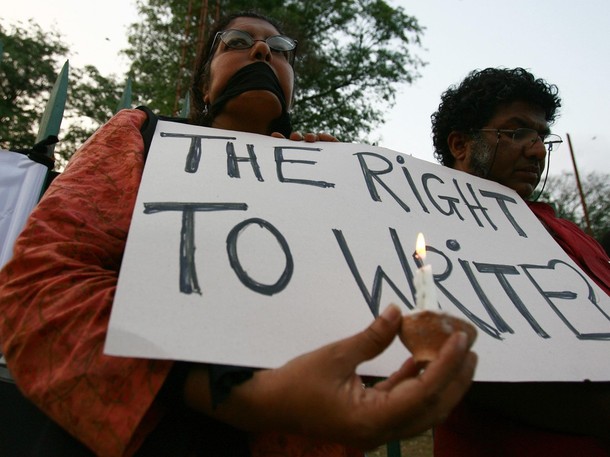
Click here to read CPJ's new report In Sri Lanka
By Bob Dietz - CPJ has launched a new report, In Sri Lanka, No Peace Dividend for Press. It takes a close look at the media in Sri Lanka, one year after the government declared a decisive victory over Tamil secessionists that ended 30 years of bitter, often genuinely suicidal ethnic conflict.
In the years running up to that victory, Sri Lankan journalists who had dared to criticize the government found themselves under serious attack - ten have been killed for their work in the last decade, and many others have been harassed, arbitrarily jailed, temporarily "disappeared," or otherwise seriously harassed. The atmosphere has become so poisonous for journalists that CPJ counts more than 25 in exile. Some of them have asked for, and received, political asylum.
Sri Lanka is one of the oldest democracies in Asia, has never had a military government, and has a popularly re-elected president and parliament brought to power in elections that have been accepted by the international community. In January, incumbent President Mahinda Rajapaksa took 58 percent of the popular vote. In April, his coalition won 144 of the parliament's 225 seats. While he might not have been handed the two-thirds majority he wanted to pass, wholesale, the constitutional amendments to allow him to run gain for a third term, nstead of seeing a president emerging with a firm grip on power, his critics see a leader with a potential stranglehold on the country's political growth.
At a point in the country's history where it should be poised to emerge from that chaos and move toward a period of reconciliation and rebuilding, Sri Lanka's future seems clouded, not least because of the government's attitude toward the media, or at least the part of the media that dares to criticize it.
A few cases in point:
Prageeth Ekanaliyagoda, a mild mannered but anti-government online columnist and cartoonist whose wife and two sons have not seen him since the evening of January 24, has simply dropped out of sight. His wife Sandhya has not been able to get police to even investigate his disappearance, her letters to the president, justice minister, and members of parliament all go unanswered. His editor at Lanka eNews, Sandurawan Senadheera, has fled the country.
Lasantha Wickramatunga, editor in chief of the popular but, again, anti-government Sunday Leader, was killed in broad daylight in January 2009, on his way to work, at rush hour on a busy street. The magistrate's hearings dragged on for a year, and then got interesting when the government suddenly implicated a political opponent -- former general Sarath Fonseka, who fought and won the war with the Tamils.
Despite a call for them to return home and work out a reconciliation made by Attorney General Mohan Peiris, not one of those journalists in exile has dared to risk the return. The cases of Prageeth Ekanaliyagoda and Lasantha Wickramatunga hang too heavily in the air for them to take the chance.
And those exiles know that those cases are not anomalies: This year, Sri Lanka ranked fourth on CPJ's Global Impunity Index. Ten journalists have been murdered over the last decade for covering the war, human rights, politics, military affairs, and corruption. There hasn't been a single conviction in any of those cases.
On May 3, World Press Freedom Day, under political pressure from the European Union, the government announced that it would grant one of the international banner cases of targeted media, J.S. Tissainayagam a presidential pardon, one that hasn't materialized so far. Tissainayagam was released on bail in January and has lived in seclusion since. The Tamil editor was first jailed in March 2008 and eventually indicted under the Prevention of Terrorism Act in August 2008.
Sri Lanka faces a brutal economic slap from the EU in August, when the preferential tariff agreement it enjoys with European countries allowing for the export of clothing and textiles to the EU at preferential rates will be rescinded. Called GSP+, the agreement includes a broad range of human rights conditions, which the EU decided in October 2009 were not being met. If GSP+ is ended, it could knock as much as 2 percent off of Sri Lanka's GDP and push hundreds of thousands of workers out of factories. That sort of economic imperative seems to be the only way to get the government to address its human rights failures, many of them tied to Sri Lanka's thirty years of internal bloodshed, sad history of ethnic conflict will take generations time to redress.
Those failures are certainly greater than just its abuse of journalists. but the Sri Lanka under President Rajapaksa could begin to reverse the country's course by addressing the unprosecuted killings of journalists, and create an atmosphere in which those of them who have fled their homeland to save their lives felt like they could return to their families and jobs in safety.
Bob Dietz is the Asia Program Coordinator for the Committee to Protect Journalists.
© The Huffington Post
![Reblog this post [with Zemanta]](http://img.zemanta.com/reblog_e.png?x-id=9e8e757e-5131-4598-91ca-0420a6ed3f37)

















No comments:
Post a Comment